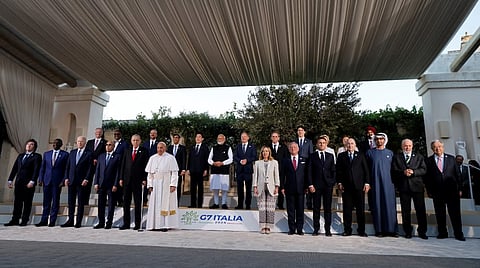
- NEWS
- the EDIT
- COMMENTARY
- BUSINESS
- LIFE
- SHOW
- ACTION
- GLOBAL GOALS
- SNAPS
- DYARYO TIRADA
- MORE

Leaders of industrialized nations under the Group of Seven (G7) called out China for “dangerous” incursions in the South China Sea, amid fears of an escalation in the contested Asia Pacific region, according to a draft statement of the summit.
The position of the richest democratic countries becomes relevant amid the start of China Coast Guard rules under which it can detain non-Chinese it may come across in the disputed West Philippine Sea (WPS).
“We continue to oppose China’s dangerous use of its coast guard and maritime militia in the South China Sea and its repeated obstruction of other countries’ freedom of navigation in the high seas,” the foreign ministers of Canada, France, Germany, Italy, Japan, the United Kingdom, and the United States said in a communiqué following the Apulia, Italy assembly.
The leaders of the powerful economic grouping reiterated their opposition to China’s “intimidation activities” in the South China Sea.
“We remain seriously concerned about the situation in the East and South China Seas and reiterate our strong opposition to any unilateral attempt to change the status quo by force or coercion,” the statement said.
“We express serious concern about the increasing use of dangerous maneuvers and water cannons against Philippine vessels,” it added.
The G7 likewise affirmed that China’s expansive maritime claim over the SCS had “no legal basis,” opposing China’s militarization and coercive and intimidation activities in the expansive waterway.
They emphasized “the universal and unified character” of the United Nations Convention on the Law of the Sea (UNCLOS) which plays an important role in setting out the legal framework that governs all activities in the world’s oceans and seas.
The G7 also noted that the 2016 Arbitral Award was “legally binding upon the parties to those proceedings,” and could serve as a “useful basis for peacefully resolving” maritime disputes.
“We reiterate that the award rendered by the Arbitral Tribunal on 12 July 2016 is a significant milestone.”
The arbitral award invalidated China’s nine-dash line claim as the Permanent Court of Arbitration ruled that it exceeded the geographic and substantive limits of China’s maritime entitlements provided for by UNCLOS.
No fear
Meanwhile, the new no-trespassing policy will not scare off Filipinos as it “has no legal basis,” Philippine Coast Guard Commandant Admiral Ronnie Gil Gavan said.
Gavan, in a radio interview, pointed out that China’s rule infringes on the Philippines’ exclusive economic zone (EEZ) in the WPS, thus Filipino fishermen are encouraged to continue their activities in their traditional fishing grounds.
“China’s regulation has no basis, thus our fishermen should not be afraid. China has no legal basis to issue such a policy,” he said.
Gavan reiterated President Ferdinand Marcos Jr.’s order to the PCG to ensure the fishermen could freely fish in the waters.
“The President said no fishermen should be affected by that policy,” he added.
He said the PCG, Bureau of Fisheries and Aquatic Resources, and Armed Forces of the Philippines (AFP) will protect the Filipino fisherfolk.
The Philippine Navy earlier said the AFP had increased its presence in the WPS after China imposed a four-month fishing ban in the SCS.
Gavan said the PCG has planned measures to maintain the situation and monitor the WPS.
“We have made several innovations but we would like to keep it to ourselves so we can maximize our limited resources, but the government will do its best to protect the fisherfolk in the area,” he said.
As China’s no-trespassing regulation starts, Senator Francis Tolentino will visit the fishermen and hold a dialogue with them at the Bajo de Masinloc off Zambales.
Beijing claims almost the entirety of the South China Sea, brushing aside competing claims from several Southeast Asian nations, including the Philippines, and an international ruling that said its stance has no legal basis.
China deploys its Coast Guard and other boats to patrol the waters and has turned several reefs into militarized artificial islands. Chinese and Philippine vessels have had a series of confrontations in the disputed areas.
Warning of detention
From Saturday, China’s Coast Guard will detain “foreigners suspected of violating the management of border entry and exit,” according to the new regulations published online.
Detention is allowed up to 60 days in “complicated cases,” it said. “Foreign ships that have illegally entered China’s territorial waters and the adjacent waters may be detained.”
Manila has accused the Chinese coast guard of “barbaric and inhumane behavior” against Philippine vessels, and President Marcos last month called the new rules a “very worrisome” escalation.
China Coast Guard vessels have used water cannons against Philippine boats multiple times in the contested waters. They collided into Philippine vessels, injuring the Filipino crew.
AFP chief of staff General Romeo Brawner told reporters Friday the authorities in Manila were “discussing several steps to protect our fishermen.”
Fishermen were told “not to be afraid, but to just go ahead with their normal activities and fish there in our exclusive economic zone,” Brawner said.
“We oppose China’s militarization and coercive and intimidation activities in the South China Sea,” read a G7 statement at the end of the summit.
Trillions of dollars in ship-borne trade passes through the South China Sea annually, and huge unexploited oil and gas deposits are believed to lie under its seabed, though estimates vary greatly.
The sea is also important as a source of fish for growing populations.
China has defended its new coast guard rules. A foreign ministry spokesman said last month that they were intended to “better uphold order at sea.”
And the Chinese defense minister warned this month that there were “limits” to Beijing’s restraint in the WPS.
China has also been angered in the past by US and other Western warships sailing through the maritime area.
